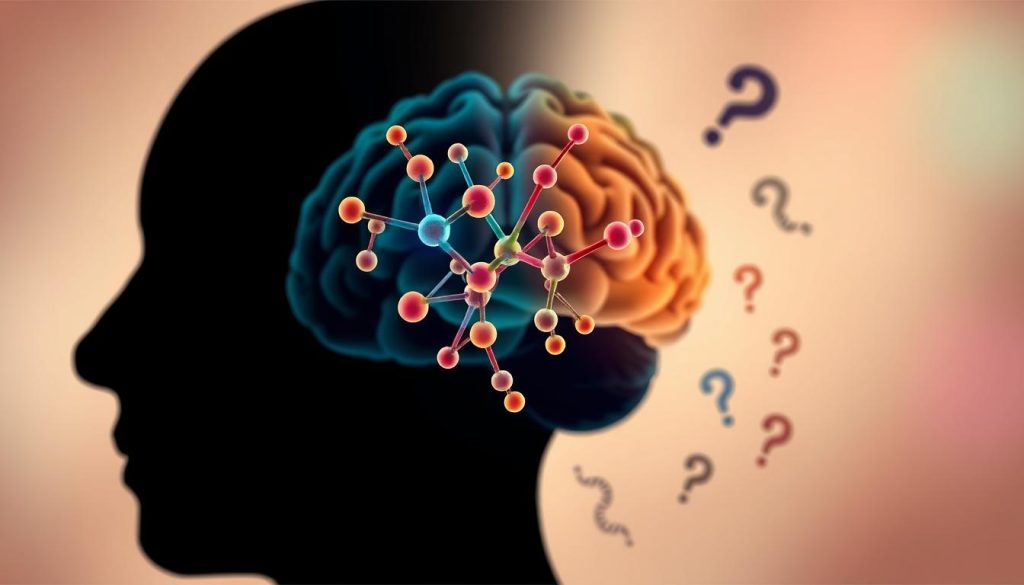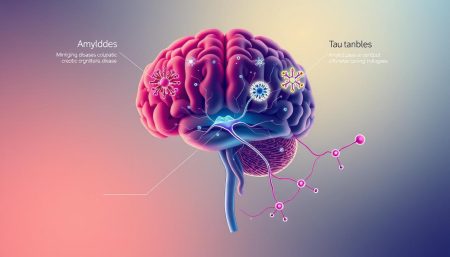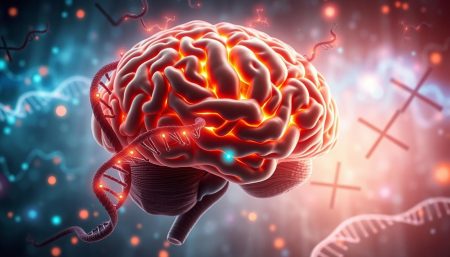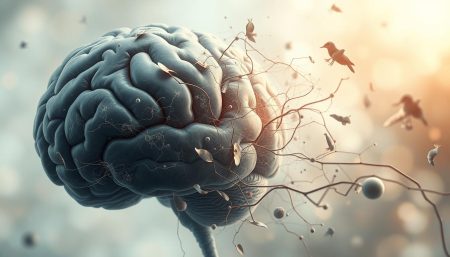Understanding the difference between dementia and Alzheimer’s disease is key for those affected. These terms are often mixed up, but they have different meanings and effects on the mind. This article aims to clear up these brain disorders, helping those who care about their health and families facing tough diagnoses.
This article will break down the differences between dementia and Alzheimer’s. It will look at symptoms, causes, and how to help. This will offer hope and understanding to those dealing with cognitive loss.
Key Takeaways
- Familiarizing with distinctive characteristics separating dementia and Alzheimer’s.
- Aiding comprehension of dementia as a syndromic condition versus Alzheimer’s as a distinct disorder.
- Highlighting the impact of cognitive decline in the context of both conditions.
- Outlining the various aspects that will be discussed to elucidate the full scope of these brain disorders.
- Providing initial guidance for recognizing the complexity and subtleties in diagnosis and management.
Understanding Dementia & Its Broad Scope
Dementia is a term that covers many medical conditions, like Alzheimer’s disease. These conditions cause a gradual decline in brain function. This decline goes beyond just memory loss. It also affects thinking, language, and daily activities.
This makes dementia a major neurodegenerative disease worldwide. It affects millions of people.
Dementia impacts not just those who have it but also their families and healthcare systems. Spotting the first signs of dementia is key. These signs include small changes in memory and mood.
Recognizing these signs early can help manage the condition better.
| Aspect of Dementia | Impact |
|---|---|
| Cognitive Decline | Challenges in memory, problem-solving, and attention |
| Social Skills | Difficulty in social interactions and maintaining relationships |
| Daily Functioning | Problems with routine activities and self-care |
When talking about neurodegenerative diseases, it’s important to know the differences. This ensures patients get the right support. It helps improve their life quality.
Examining Alzheimer’s Disease: A Specific Brain Disorder
Alzheimer’s Disease is the most common type of dementia. It is known for its slow progression and specific brain changes. Understanding Alzheimer’s causes and Alzheimer’s symptoms is key to finding better treatments and care.
The brain changes in Alzheimer’s include beta-amyloid plaques and tau tangles. These changes harm how neurons work and talk to each other. This harm leads to a decline in thinking and doing daily tasks, affecting a person’s life greatly.
- Memory loss that disrupts daily activities
- Challenges in planning or solving problems
- Difficulty completing familiar tasks at home or work
- Confusion with time or place
- New problems with words in speaking or writing
Recognizing symptoms early is crucial. It allows for treatments that may slow the disease’s progress. Knowing Alzheimer’s causes also helps in finding ways to prevent it. This includes looking at genetics, environment, and lifestyle choices.
| Stage of Progression | Cognitive Impact | Behavioral Changes |
|---|---|---|
| Early Stage | Mild forgetfulness, especially of recent events | Slight mood swings, anxiety |
| Middle Stage | Increased memory loss and confusion | Withdrawal from work or social activities |
| Late Stage | Significant impairment in communication | Need for full-time, personal care |
Understanding these patterns helps us see how Alzheimer’s affects the brain. It also prepares caregivers and patients for what’s ahead. It shows the need for strong support systems to manage symptoms.
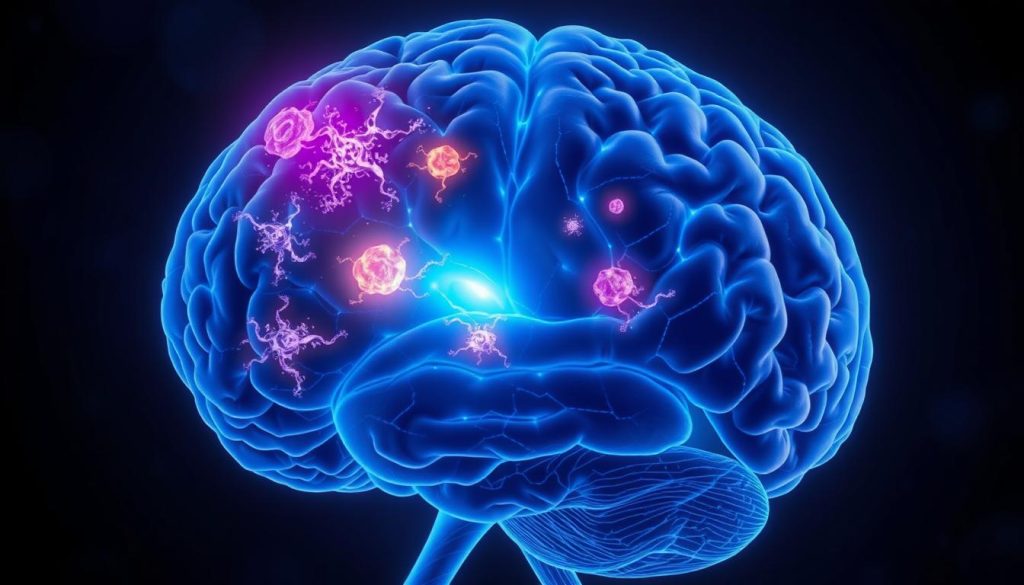
Research is always looking for new ways to fight Alzheimer’s causes. This leads to better treatments and helps millions of people worldwide. By combining knowledge of brain changes with symptoms, we can find ways to ease the disease’s impact.
What is the Difference Between Dementia and Alzheimer’s Disease
It’s important to know the difference between dementia and Alzheimer’s disease. Dementia is a broad term for symptoms like memory loss and thinking problems. These symptoms are severe enough to affect daily life. Alzheimer’s disease is a specific type of dementia that affects the brain’s thinking, memory, and language areas.
Understanding Alzheimer’s disease is key. It’s a brain disease that gets worse over time. It causes cognitive impairment and changes in behavior. Here’s a simple comparison of both conditions:
| Aspect | Dementia | Alzheimer’s Disease |
|---|---|---|
| Definition | Symptom complex due to a variety of brain illnesses. | A specific neurodegenerative disease causing most cases of dementia. |
| Symptoms | Varies based on cause, generally involves cognitive decline. | Memory loss, disorientation, mood and behavior changes, confusion about events, time and place. |
| Progression | Can be static, progressive, or reversible depending on the cause. | Generally slow but progressive deterioration of brain function. |
| Treatment | Focuses on managing symptoms and slowing progression. | No cure, treatment aims to delay symptoms and improve quality of life. |
Doctors use detailed medical tests to tell these conditions apart. Many people get confused because these terms are often used together. But, for accurate information, check out the Alzheimer’s Association website.
Knowing the difference helps us understand and support people with these conditions better. This knowledge is crucial for making informed decisions about care and planning for the future.
Common Dementia Symptoms and How They Manifest
Spotting dementia symptoms early is key to better management. This part looks at how symptoms show up in thinking, talking, and feeling.
Memory Challenges and Everyday Activities
Memory loss is a common first sign of dementia. It makes it hard to remember new things and recall past events. Simple tasks like remembering appointments or managing medications become tough.
As cognitive impairment gets worse, help from caregivers is vital. They assist with daily tasks.
Language Difficulties and Communication Barriers
Language skills often worsen as dementia progresses. This leads to trouble finding the right words and forming clear sentences. It also affects writing, making social interactions and expressing thoughts harder.
Personality Changes and Mood Fluctuations
Mood swings and changes in personality are big dementia symptoms. People might become more irritable, apathetic, or anxious. Tasks and hobbies that once brought joy may lose appeal.

Recognizing Alzheimer’s Symptoms: Beyond Memory Loss
When we think of Alzheimer’s disease, memory loss is often the first thing that comes to mind. But Alzheimer’s symptoms go far beyond just forgetting things. They include many cognitive and behavioral issues that can really affect daily life. It’s important to know all about these symptoms to catch Alzheimer’s early.
One symptom that’s not as well-known is getting lost in time and place. People might not know where they are, even in places they know well. They might also get dates and seasons mixed up. Things like driving can become very hard and even dangerous.
Impaired reasoning and judgmentare also big signs of Alzheimer’s. This can show up as making bad choices, having trouble solving problems, or not being able to plan things. When people can’t manage their money well, it’s often one of the first signs that something is wrong.
Behavior and personality changes can also be signs of Alzheimer’s getting worse. These can include:
- Feeling less interested in things or pulling away from friends and family
- Having mood swings that are not usual for them
- Getting angry or aggressive more easily
- Changes in how much they sleep or eat
It’s very important for family and caregivers to see these signs as possible Alzheimer’s symptoms. They should not just think of them as normal aging.
“Early detection and intervention are key in managing Alzheimer’s disease. Recognizing the comprehensive range of Alzheimer’s symptoms beyond memory loss can lead to more effective care strategies and improved quality of life for those affected.”
As Alzheimer’s gets worse, it can really change someone’s life. This shows how important it is to have care plans that change as the person’s needs do.
To really help someone with Alzheimer’s, you need to understand all the symptoms. This helps doctors make the right diagnosis. It also helps provide the right care and support for managing the disease.
The Role of Cognitive Impairment in Dementia and Alzheimer’s
Cognitive impairment is key in the growth of dementia and Alzheimer’s. It greatly affects daily life and quality of life. Knowing how it impacts thinking and the level of severity helps caregivers and doctors offer better support and treatments.
Assessing Cognitive Functions Affected
It’s crucial to look at the thinking skills affected by dementia and Alzheimer’s. Memory loss is well-known, but other skills like planning, reasoning, and focus are also hit hard. This wide range of effects means Alzheimer’s symptoms can differ a lot from person to person.
Differentiating Severity Levels in Dementia and Alzheimer’s
Doctors divide cognitive impairment into mild, moderate, and severe levels. Each level brings its own set of challenges and symptoms. This means different care plans and treatments are needed to help manage daily life and improve quality of life.
| Severity Level | Impact on Cognitive Function | Typical Symptoms |
|---|---|---|
| Mild | Noticeable memory lapses affecting daily tasks | Forgetting words or location of everyday items |
| Moderate | Greater difficulty in making decisions and completing tasks | Confusion, significant difficulty in handling complex tasks like managing finances |
| Severe | Major impaired cognitive functions, requiring full-time assistance | Loss of ability to communicate effectively, requiring full-time care |
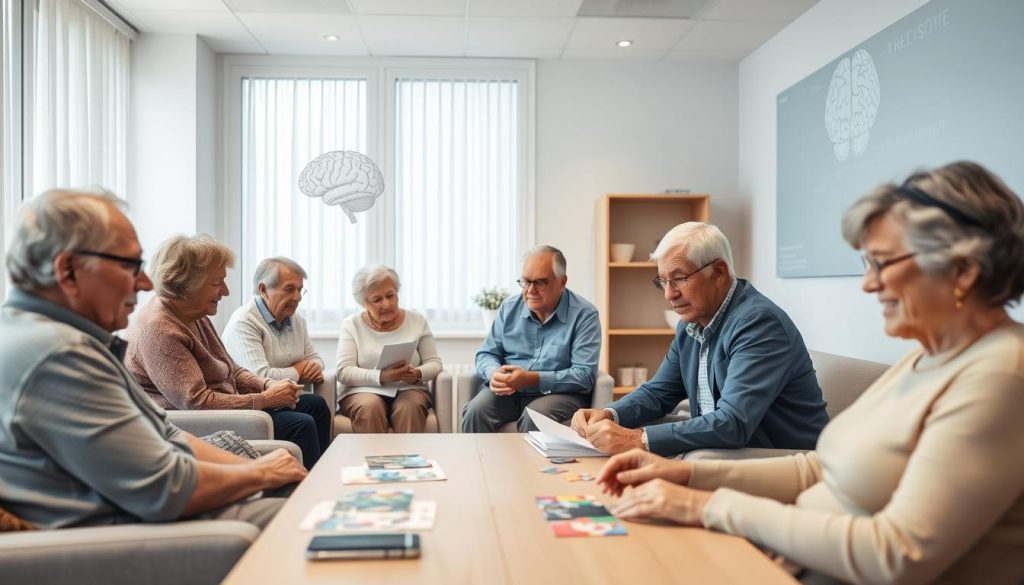
Understanding cognitive impairment helps in more caring caregiving. It also leads to specific treatments for dementia and Alzheimer’s symptoms. With detailed assessments and focused support, the aim is to boost thinking skills and improve well-being.
Diving Into the Causes Behind Alzheimer’s Disease
Understanding Alzheimer’s disease is key to early detection and better treatments. We will look at the many causes, including genetics, lifestyle, and environment. These factors all play a role in this neurodegenerative disease.
Alzheimer’s is a major neurodegenerative disease, affecting millions worldwide. It’s caused by a mix of genetic and environmental factors. These factors slowly damage our brain health.
Genetics are important in Alzheimer’s, with genes like APOE increasing risk. But, genetics alone don’t decide if you’ll get the disease. Lifestyle choices like diet, exercise, and mental activity also matter a lot.
| Factor | Impact on Alzheimer’s Risk |
|---|---|
| Genetic Predisposition | Increases risk, especially with family history |
| Lifestyle Choices | Being inactive and eating poorly can raise risk |
| Environmental Exposures | Toxins and pollutants may increase risk |
Research is ongoing to understand how these factors work together. It’s about how they lead to brain damage over time.
It’s crucial to keep studying these areas to grasp how they lead to Alzheimer’s. This knowledge is vital for prevention and treatment. It also helps support those dealing with this disease.
Exploring the Various Types of Dementia
Dementia includes many neurodegenerative diseases, each with its own challenges and symptoms. Knowing about the different types helps in diagnosing and improving care for patients.
Alzheimer’s Disease as a Subtype of Dementia
Alzheimer’s disease is the most common type of dementia. It causes brain cells to die due to abnormal proteins. It makes up 60-80% of dementia cases, making it a key area for research and care.
Other Common Forms of Dementia
There are many other types of dementia that affect millions:
- Vascular Dementia: This type happens after a stroke and blocks blood flow, causing brain problems.
- Lewy Body Dementia: It’s marked by abnormal proteins called Lewy bodies, affecting thinking and movement.
- Frontotemporal Dementia: It damages the brain’s frontal and temporal lobes, changing personality, behavior, and language.
Each dementia type needs its own management and treatment plan. This shows how important accurate diagnosis and personalized care are.
Understanding these neurodegenerative diseases is key. Awareness and education help spot early signs and symptoms. This leads to better management and care for those affected.
Early Signs of Dementia: Detecting the Warning Signals
Spotting the early signs of dementia is key to managing it. Memory loss is a common symptom, but it’s not the only one. Knowing other signs can help catch dementia early and start care sooner.
One early sign is small memory changes. Forgetting where you put things or not remembering recent talks can be signs. These small forgets might mean something big is happening with your brain.
Spotting early signs not only assists in potentially slowing the progression through timely interventions but also prepares families and caregivers for future care needs.
Besides memory loss, other early symptoms include:
- Difficulty finding the right words during conversations
- Changes in mood or personality, such as increased irritability
- Decreased or poor judgment
- Withdrawal from work or social activities
- Changes in gait or balance
Seeing these signs alone doesn’t mean you have dementia. They can also show other health problems. But if these signs keep getting worse, it’s time to see a doctor.
If you see these early signs of dementia, talk to a doctor. They might do tests to see how your brain is doing. Finding dementia early can help plan better care and improve life quality.
Knowing these signs and acting fast is a smart way to deal with dementia. It helps people and their families get the help they need. This way, they can face the disease together, with support and care.
Neurodegenerative Diseases: Broadening the Perspective
The term neurodegenerative diseases covers many medical conditions. These diseases cause the nervous system to break down over time. Alzheimer’s disease and dementia are well-known, but Parkinson’s disease and amyotrophic lateral sclerosis (ALS) also have a big impact.
These disorders share common traits. They often lead to cognitive impairment and loss of motor function. People with these diseases find it harder to do everyday tasks. This section aims to explain how these diseases are connected.
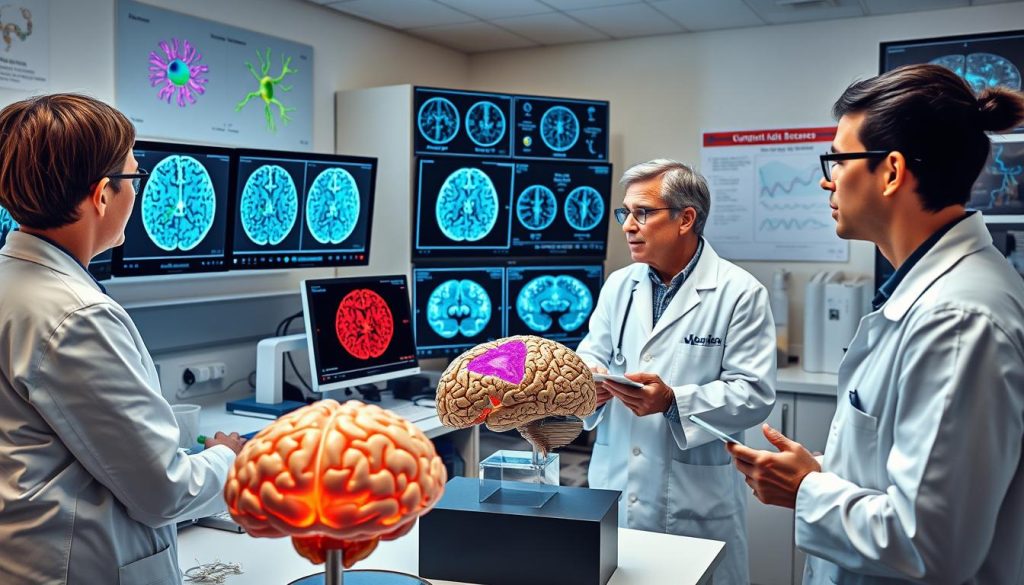
| Disease | Primary Symptoms | Impact on Cognition |
|---|---|---|
| Parkinson’s Disease | Movement-related issues, tremors, stiffness | Mild cognitive impairment leading to possible dementia |
| ALS | Muscle weakness, speech difficulties | Cognitive changes in some cases, primarily executive function |
| Alzheimer’s Disease | Memory loss, disorientation, mood swings | Significant cognitive impairment including severe memory loss |
Learning about the similarities and differences between these neurodegenerative diseases helps us understand how to treat them. The goal is to reduce cognitive impairment and manage symptoms. This shows why research and innovation in this area are so important.
Prevalence and Risk Factors Associated with Dementia and Alzheimer’s
It’s important to know how Alzheimer’s and other dementia types affect people. These conditions are big health problems worldwide. They touch the lives of millions and their families.
Mostly, dementia hits older adults, with Alzheimer’s being the top cause. Things like genes, age, and lifestyle play big roles in who gets it. This part explains these factors in more detail.
- Age: Getting older, especially after 65, raises the chance of getting dementia.
- Genetics: If your family has a history of dementia, you’re at higher risk. This is especially true for familial Alzheimer’s.
- Lifestyle Factors: Bad heart health, not moving enough, and eating poorly can up your dementia risk.
Here’s a closer look at the risk factors for dementia:
| Age Group | Prevalence of Dementia | Risk Factor |
|---|---|---|
| 65-74 | 3% | Mild |
| 75-84 | 17% | Moderate |
| 85+ | 32% | High |
These numbers show why finding and treating dementia early is key. It can make symptoms less severe and improve life quality. Knowing what causes Alzheimer’s and dementia types helps us make better prevention plans. These plans could help people all over the world.
Diagnostic Approaches for Dementia and Alzheimer’s Disease
Finding dementia symptoms and Alzheimer’s symptoms early is key. Medical science has made many diagnostic methods. These methods are designed to understand these complex conditions well.
First, doctors look at your medical history and do cognitive tests. These tests check memory, problem-solving, and language. They help spot early signs of cognitive decline.
Then, doctors use brain imaging to see how the brain works. These images help rule out other causes of memory loss. They also show if Alzheimer’s changes are present in the brain.
| Diagnostic Method | Description | Relevance to Alzheimer’s / Dementia |
|---|---|---|
| Neuropsychological Testing | Assessment of cognitive functions via standardized tests | Helps identify specific cognitive deficits linked to different forms of dementia |
| MRI & CT Scans | High-resolution images of the brain’s structure | Can indicate abnormal brain shrinkage or other structural anomalies |
| PET Scans | Measures levels of brain activity and chemical composition | Detects plaques and tangles, hallmark features of Alzheimer’s disease |
| Cerebrospinal Fluid Analysis | Examination of fluid surrounding brain and spinal cord for abnormal proteins | Can confirm presence of Alzheimer’s-related proteins, such as beta-amyloid and tau |
Genetic testing can also provide important information, especially for those with a family history of Alzheimer’s. It’s not used for routine diagnosis but can be crucial for understanding inherited risks. This helps in creating more focused care plans.
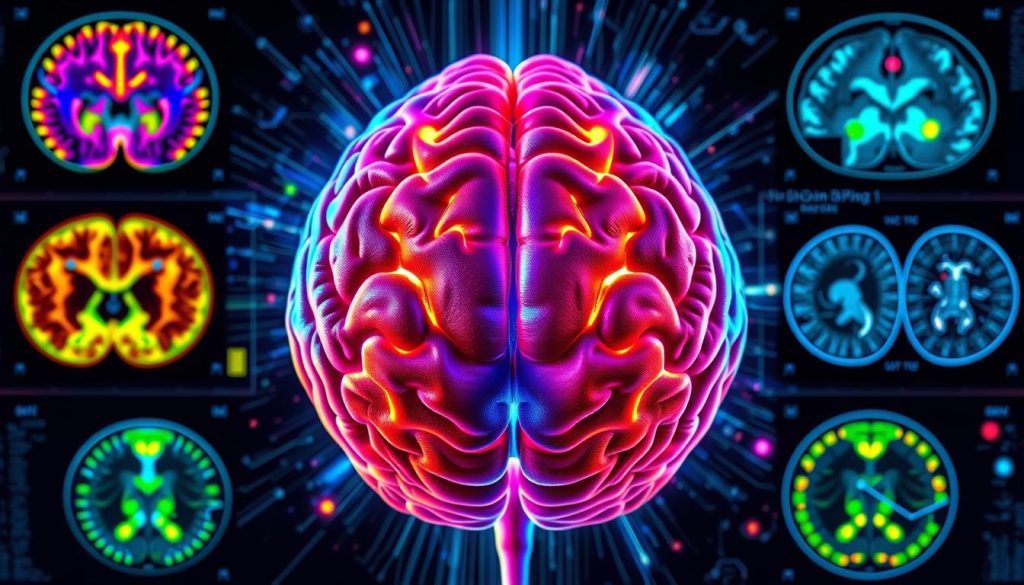
Treatment plans are made based on these findings. They aim to slow down dementia symptoms and improve life quality. Doctors use medication, lifestyle changes, and cognitive therapies to manage Alzheimer’s symptoms.
Therapeutic Strategies and Management of Cognitive Decline
After getting a diagnosis of Alzheimer’s or another dementia-related illness, creating a good management plan is key. This plan includes different strategies to reduce cognitive impairment, lessen dementia symptoms, and manage Alzheimer’s symptoms. As the disease gets worse, it’s important to tailor care to fit changing needs.
- Multidisciplinary Approaches: Using medicines and therapies to tackle symptoms fully.
- Lifestyle Modifications: Making diet changes, staying active, and doing brain exercises to keep mental skills sharp.
- Supportive Therapies: Keeping patients and caregivers connected and emotionally supported to improve life quality.
Below are ways each method can slow down the disease and make life better for those affected.
| Strategy | Goals | Expected Outcomes |
|---|---|---|
| Pharmacological Treatments | Manage mood, behavior, and cognitive symptoms | Lessening Alzheimer’s symptoms severity |
| Cognitive Therapies | Boost mental function | Better memory and slower cognitive impairment growth |
| Behavioral Therapies | Change hard behaviors | Less distress and safer patients |
| Physical Activity | Boost physical health | Improved mobility and mood, less dementia symptoms |
To use these strategies well, teamwork is key. Healthcare pros, caregivers, and patients must work together. It’s also important to watch how the disease is progressing and change treatments as needed.
Even though there’s no cure for dementia or Alzheimer’s, good management can help a lot. It helps patients and those around them, making a supportive space for both medical and emotional needs.
Conclusion
We’ve looked into the brain’s health and found the difference between dementia and Alzheimer’s disease. Dementia is a broad term, and Alzheimer’s is a common type under it. The key difference is that dementia is a wide range of symptoms, while Alzheimer’s is a specific brain disease.
Knowing the early signs of dementia is key for early help. These signs can be small, like trouble finding words or doing daily tasks. They also affect mood and personality. This shows how important it is to understand and care for those with dementia and Alzheimer’s.
In closing, we focus on more than just facts. We also talk about the need to support and care for those affected. By learning about dementia and Alzheimer’s, we can build a more caring community. Our goal is to help and support those on this challenging journey.
FAQ
Q: What is the difference between dementia and Alzheimer’s disease?
A: Dementia is a term for symptoms like memory loss and trouble thinking. Alzheimer’s is a type of dementia and the most common cause. It’s marked by amyloid plaques and tangles in the brain, leading to brain cell death.
Q: What are some early signs of dementia and Alzheimer’s disease?
A: Early dementia signs include memory loss and trouble with familiar tasks. Confusion and trouble understanding images are also signs. Alzheimer’s often starts with forgetting new information.
Q: How do dementia symptoms differ from normal age-related memory changes?
A: Dementia symptoms are more severe than normal memory loss. It’s normal to forget names or appointments sometimes. But dementia means forgetting important information and asking the same questions over and over.
Q: What are the cognitive impairments associated with Alzheimer’s disease?
A: Alzheimer’s can cause memory loss and problem-solving issues. It also affects judgment, planning, and language.
Q: Are there different types of dementia?
A: Yes, there are several types, including Alzheimer’s, vascular dementia, and frontotemporal dementia. Each has its own symptoms and progression.
Q: What causes Alzheimer’s disease?
A: The exact cause of Alzheimer’s is unknown. It’s thought to be due to genetics, lifestyle, and environmental factors. Amyloid plaques and tau tangles in the brain are key signs of the disease.
Q: How is Alzheimer’s disease diagnosed?
A: Diagnosing Alzheimer’s involves a medical evaluation. This includes a detailed history, cognitive tests, and brain imaging. Doctors also rule out other causes of memory loss.
Q: What therapeutic strategies are used in managing dementia and Alzheimer’s disease?
A: Therapy for dementia and Alzheimer’s includes medication and lifestyle changes. It also includes cognitive therapy and support for caregivers. The goal is to improve quality of life and manage symptoms.
Q: Can lifestyle changes affect the risk of developing dementia and Alzheimer’s disease?
A: Yes, lifestyle changes can help reduce dementia risk. Eating well, staying active, not smoking, and controlling blood pressure are important. Staying mentally and socially active also helps.
Q: What are the common emotional and personality changes associated with dementia?
A: Common changes include increased irritability and moodiness. Anxiety, depression, and apathy are also common. People may also show less interest in activities they once enjoyed.
Q: Is Alzheimer’s disease hereditary?
A: Genetics can play a role in Alzheimer’s, especially early-onset. But most cases are late-onset and not as strongly linked to genetics. Family history is a risk factor, but not everyone with a family history will get Alzheimer’s.
Q: How does Alzheimer’s disease progress over time?
A: Alzheimer’s progresses in three stages: mild, moderate, and severe. As it advances, memory loss and cognitive dysfunction worsen. This requires more comprehensive care.
Q: Are there ways to prevent dementia and Alzheimer’s disease?
A: There’s no sure way to prevent dementia or Alzheimer’s. But a healthy lifestyle may help protect against cognitive decline. This includes a balanced diet, exercise, and mental engagement.
Q: What is the average age for the onset of Alzheimer’s symptoms?
A: The average age for Alzheimer’s symptoms is after 65. But early-onset Alzheimer’s can occur in the 30s, 40s, and 50s, though it’s rare.
Q: How prevalent are dementia and Alzheimer’s in today’s society?
A: Dementia and Alzheimer’s are common, especially with aging. Alzheimer’s is the sixth leading cause of death in the U.S. Over 6 million Americans live with Alzheimer’s as of 2021.












